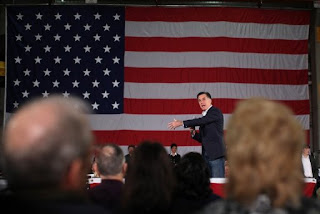PHOENIX, Arizona — Immigration fuels fierce passions in Arizona, both for and against the waves of immigrants who cross its southern border with Mexico -- but you would hardly know it to listen to Republican candidates.
Mitt Romney, who won the party's primary here handily this week, barely mentioned it in his campaign stops, as he focused on the economy and jobs, issues on which it is easier to find common ground in these tough times.
Arizona Senator John McCain, who won the Republican candidacy in 2008 but lost the White House to Democrat Barack Obama, acknowledged as much here on Tuesday when he spoke on behalf of Romney, who he has endorsed since January.
In a brief speech he trumpeted the former Massachusetts governor's economic credentials, as well as his ability to be commander in chief and restore America's power and influence in the world.
But not a word about immigration.
"I think it's pretty clear that immigration was not the biggest issue in this campaign, in fact it wasn't mentioned that much. The biggest issue on this campaign is jobs and the economy," he told AFP.
Arizona, which has a vast legal and illegal Hispanic population, has been in the eye of a storm since it became the first US state to vote a law -- so called "SB1070" -- allowing police to stop and search any person they suspect.
The Obama administration opposed the law, and has managed to freeze its most contested parts until a Supreme Court ruling in June -- although this has not stopped other states including Utah and Alabama from following Arizona's lead.
Republican state lawmaker John Kavanagh agrees with McCain that immigration has not featured as prominently as one might have expected.
"It's gone on the back burner because our dismal economy has pushed (it) to the side," he told AFP, adding "immigration is still a big problem in Arizona."
"Less illegals are crossing the borders because there are less jobs, but the underlying problem is still there, and we know that when the economy improves and the jobs come back, so too will the illegals," he added.
For civil rights groups, the real problem for Republicans -- who held a TV debate here last week -- is not that they relegate immigration to a secondary campaign issue, but that they don't propose any solutions.
"They are basically talking about keeping 11 million in the same situation, and they are talking about deportation," said Eduardo Barraza, director of the Hispanic Institute of Social Issues in Mesa, outside Phoenix.
In the debate, the candidates did agree on one thing: the need to secure the border with Mexico, by whatever means possible.
And Romney took the opportunity to vigorously defend Arizona's immigration law, and to reiterate his opposition to the so-called DREAM Act, which would let youngsters who came to the US illegally to go to college or join the army.
"I wouldn't say that immigration has not been addressed," said Alessandra Soler Meetze, head of the Arizona branch of the American Civil Liberties Union (ACLU).
"I feel like they are propagating and perpetuating immigration myths to please their public... what is certainly missing is a serious discussion about it. We have to move beyond this extremist rhetoric."
For Camila Gallardo, spokeswoman of the National Council of La Raza, the main Hispanic rights group in the US, "so far unfortunately the Republicans' arguments are pretty negative."
"We hope that once the primaries are finished, the person chosen will make an effort to talk to our community respectfully, and that they will make real proposals," she added.
Because, while neglected in the primaries, immigration could return as a major theme in the real presidential campaign, between whoever wins the Republican nomination and Obama in the run-up to the November vote.
Soler Meetze said the Supreme Court's decision in June will "send a very important message to the states.
"It's gonna answer this question as to who has the authority to regulate immigration matters. I do think that after this decision, the issue is going to rise again."
Barraza is more doubtful, notably if the economy is still flagging during the campaign leading up to the November 6 presidential election.
"Because how in the world could anybody think now, in the political context, that bringing all these people into legality, legalizing all these people is gonna benefit the economy?" he asked.
"In a way yes, because they will pay taxes, but in the same way it is gonna be seen as millions of people being able to get jobs legally. So is that something that this society is ready to accept? I would say no."


 3:02 PM
3:02 PM

 Posted in:
Posted in: 